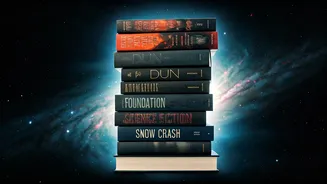Asimov's Foundation Series
The 'Foundation' series, penned by Isaac Asimov, is a cornerstone of science fiction. The saga introduces readers to a future where a galactic empire is crumbling.
Hari Seldon, a psychohistorian, has devised a plan using his mathematical model to predict the fall and shorten the dark age to come. This series is famous for its exploration of societal trends, the interplay of history and prophecy, and the impact of individual actions on the grand scale of the cosmos. Asimov masterfully portrays the power of foresight and the resilience of the human spirit in the face of inevitable decline. It's a complex, multi-layered narrative that is well-loved for its intricate plotting and compelling philosophical themes.
Herbert's 'Dune'
Frank Herbert’s 'Dune' is a masterclass in world-building and is often described as one of the best sci-fi novels ever written. It transports readers to the desert planet Arrakis, the sole source of the invaluable spice melange. The narrative follows Paul Atreides as he navigates political intrigue, ecological themes, and religious overtones, all while struggling with his destiny. 'Dune' is renowned for its immersive setting, rich characters, and profound exploration of power, ecology, and religion, and it has inspired countless works in various forms of media. Its complex universe has provided a foundation for many science fiction stories that followed, cementing its legacy.
Gibson's 'Neuromancer'
William Gibson's 'Neuromancer' is a seminal work of cyberpunk. It unveils a gritty, neon-lit future dominated by artificial intelligence, cyberspace, and corporate control. The novel focuses on Case, a former hacker, who is offered a chance at redemption by undertaking a dangerous mission. 'Neuromancer' introduced a host of groundbreaking concepts, including the Matrix-like cyberspace and the exploration of artificial consciousness and the fusion of technology with the human body. Its influence on subsequent literature, film, and culture has been massive, and it remains a compelling read for its innovative vision and gripping storytelling.
Stephenson's 'Snow Crash'
Neal Stephenson's 'Snow Crash' blends cyberpunk with the digital world and pop culture. It introduces readers to Hiro Protagonist, a pizza delivery driver and hacker in a Los Angeles that's been divided among powerful entities. The story blends virtual reality, linguistics, and ancient Sumerian mythology. 'Snow Crash' explores themes of virtual reality, linguistic programming, and the nature of reality itself, through a series of memorable characters and mind-bending scenarios. Its innovative ideas and blend of genres has made it a standout in the science fiction landscape.
Adams' 'Hitchhiker's Guide'
Douglas Adams' 'The Hitchhiker's Guide to the Galaxy' is a comedic masterpiece that takes readers on a hilarious journey through space and time. It follows the hapless Arthur Dent, who is rescued from Earth just moments before its destruction to make way for a hyperspace bypass. The novel, filled with eccentric characters and absurd situations, explores philosophical questions about life, the universe, and everything. Adams' witty prose and satirical humor have made 'The Hitchhiker's Guide' a beloved classic, offering a fresh, funny perspective on the vastness of the cosmos.





















